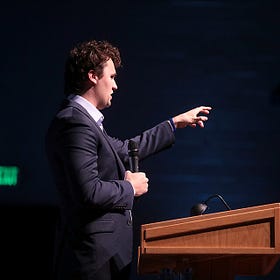The progressive retreat from American life
What Katie Porter's disastrous CBS interview signifies
This week, Democratic congresswoman Katie Porter of California, the frontrunner for governor of the state, sat down for what rapidly became a hilariously disastrous interview with a local CBS affiliate when reporter Julie Watts asked, “What do you say to the 40% of California voters, who you’ll need in order to win, who voted for Trump?”
Porter furrowed her brow, looked at Watts like she was stupid, and asked, “How would I need them in order to win, ma’am?” Then she looked off camera and laughed, as if Watts had just asked something idiotic. Watts patiently explained this was a question she was asking all the mayoral candidates, but Porter continued to take offense, and eventually stormed out. The reporter Yashar Ali commented, “Someone who used to work with Katie Porter sent me this clip from a train-wreck interview with her and said, ‘Now imagine what she’s like when there aren’t cameras around.’”
Megyn Kelly remarked, “Are there other terrible interviews with Katie Porter? This is the most entertaining, unifying thing since tiger king!” And it turns out, there are more interviews, including one in which a staffer can be seen in the background cleaning up, and Porter screams at the young woman, “Get out of my fucking shot!”
Porter seems like the kind of person who would watch Hasan Piker shock his dog for laughs and find it funny. But her awfulness as a person aside, I am interested in the fact that she walked out of the interview. To my mind, this is of a piece with the dominant sensibility among progressives that certain topics are simply settled, no longer up for debate, and frankly beneath them. I have seen this in endless videos in which influencers attempt to speak with leftist student protesters, often simply asking them why they are protesting, and the students will not explain. They are protesting in public, yet unwilling to even name why they are there. It’s comedy.
But this is not because they’re camera shy so much as because they view having to explain themselves as demeaning. I cannot tell you how many times I have heard a progressive young woman say she was not going to do the “emotional labor” of explaining why someone she called racist was, in fact, racist. This is the same logic of cancel culture, which seeks to silence people who say unorthodox or offensive things, rather than hearing them out or engaging if one disagrees. This is the same logic of the 34% of students who say violence is an acceptable way to stop a campus speech.
Why the left has no Charlie Kirk
Why does the left have no Charlie Kirk? That question seems to be going around a lot lately. This morning, my social media feed served up two articles that both posed roughly the same question. Namely, why is there no figure on the left who is going into ideologically hostile s…
This progressive regression is also the same logic of the 2.5 million people who left X for Bluesky, or those who support “hate speech” laws, or having the UK police show up at your door because you posted the lyrics to a rap song to pay tribute to a boy who died in a road crash. This unwillingness to defend one’s position is why Ben Shapiro used to have as his pinned post on X, “Facts don’t care about your feelings.” Because, as many of us began to notice around the time he wrote that, progressives were increasingly using moral grandstanding when the facts were not on their side. This is how you end up with progressives arguing that logic is racist.
But the impulse to say, “Fine then, screw these people” is the wrong one. Isolation is the primary force behind radicalization. When radical groups target a teen for recruitment, they hit the kid with love bombing — and encouraged isolation. This is how white supremacist groups do it. This is also how the trans movement operates, attacking children with the one-two combo of utter affirmation, followed by the notion that you must remove people from your life who challenge the ideology, even your own parents.
Interview with cult expert Steven Hassan
If you consider yourself progressive, think of MAGA. If you consider yourself conservative, think of wokism. Now ask yourself:
The antidote to this, cult expert Steven Hassan once told me, is to stay in touch. Keep your loved ones in your life. Do not push people away that you truly care about over something such as politics. If it seems especially difficult, chances are you are over-indexing the value of your political beliefs in a relationship that is not fundamentally political in nature. The only way that families, and societies, can thrive is when we stay united despite our differences. After all, true strength lies in unity, and diversity has value only to the degree it adds to a united society. The traditional motto of the United States, E pluribus unum, means Out of many, one. It does not simply say, Pluribus.
Six times more progressives than conservatives say it’s acceptable to be happy about a public figures’ death.
And, indeed, as progressives have retreated more and more, we have seen them become more and more radical, as well as more and more hostile. It is wrong to think of Charlie Kirk’s killer simply as a deranged teen, and not as a deranged teen who was fed a particular diet of trans radicalism such that he became convinced Kirk was a trans-hating monster and that monsters like him cannot be reasoned with. As he himself said about Kirk, “I had enough of his hatred. Some hate can’t be negotiated out.” And this is a common view among progressives, that some kinds of hate simply are not to be engaged or reasoned out, and I am sympathetic to this view, but they combine it with the perception that everyone to the right of them is fascist, and that violence is an acceptable response to fascist ideology even when fascism is so broadly defined as to include people like Ben Shapiro or Charlie Kirk.
Nor can you both-sides this problem, as I have heard many people do. Last month, YouGov released a report on political violence, finding that six times more progressives than conservatives say it’s acceptable to be happy about a public figures’ death. The same report found four times more progressives than conservatives say political violence is justified. Again, this is not a problem on both sides. And while you do have violence on the far-right, the number of actual deaths caused per year by white supremacists is extremely low.
In 2019, 51 people were killed in America due to a hate crime, whether leftist or far-right. But even if we assume all 51 deaths were due to far-right extremism, in a country of 350 million people, that’s nothing. On the left, rather than a small amount of lethal violence at the extreme end, you have a more low-level, but widely embraced, support for violence.
This is similar with racism, where on the right, in my experience, most people are not racist, but at the far-right, you have the Hammerskins and Atomwaffen Division. On the left, you have Antifa, but with the exception of 2017, the far-right consistently kills more people than the far-left — but the total killed by the far-right per year ranges from three to 10 homicides. That’s all. Meanwhile on the left, you have a kind of tier-two, generalized racism that is almost universal to the left of liberalism. And I tend to think the latter is more dangerous because it’s more rampant, and because, being that it is less overt, it snakes its way into more aspects of our society.
David Hirsh on left antisemitism
In the wake of the October 7 massacre in Israel, we have seen pro-Hamas activists on the political left celebrate the atrocities. The problem of left antisemitism seems worse now than ever before, or perhaps it has always been lurking just beneath the surface and now the mask has finally slipped.
The problem with the notion of keeping people in your life despite political differences is that this is difficult to scale. How do we do this as a culture, as a nation? It seems to me that one figure on the right who was doing this work with young people was Charlie Kirk, and they murdered him for it. Still and all, we have little choice. As Ta-Nehisi Coates said in his recent interview with Ezra Klein, we have to live in the same country as these people. But whereas he takes this to mean we should retreat, I agree with Klein that we must therefore lean in, work the problem, and whatever happens, remain hopeful.
We must continue to debate, engage, and discuss. We must take the time to be well-read across ideologies, and read from opposing views, because who knows? They may, from time to time, level us with a profound insight. We must also practice the art, as Kirk did, of starting by finding something, anything, however small, where we can agree. And we have to sharpen the art of civility in our discourse, of tempered speech, of letting our intellectual curiosity outpace our outrage. These are small steps. But we must start somewhere. And if enough of us work together on this, you’d be amazed how fast it can spread, and how much impact we might actually have.







The "retreat" that you speak of is simply flopping on the floor and flailing, screaming that reason is "sexist" and logic "racist" is simply the pouting arguments of children. Similarly, those who believe the universe was created in six days have already hurt their own cause when they later declare to have "science facts" to back their arguments.
Why must everyone be either "left" or "right?" "Progressive" or "MAGA?" Who will speak of the increasing isolation of the "wings" of ideology, those of us who view both "sides" to be irrational screamers..and when?
Is all this silliness just for attention, money, votes, clicks, and likes? Is that what we've fallen to?
Minor correction:
"Watts patiently explained this was a question she was asking all the mayoral candidates"
Should be gubernatorial candidates.